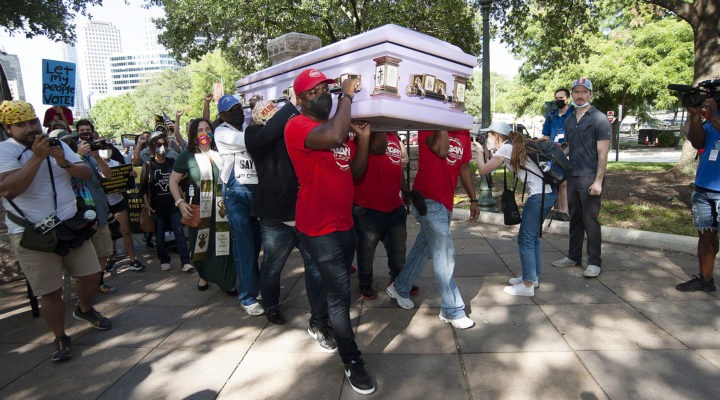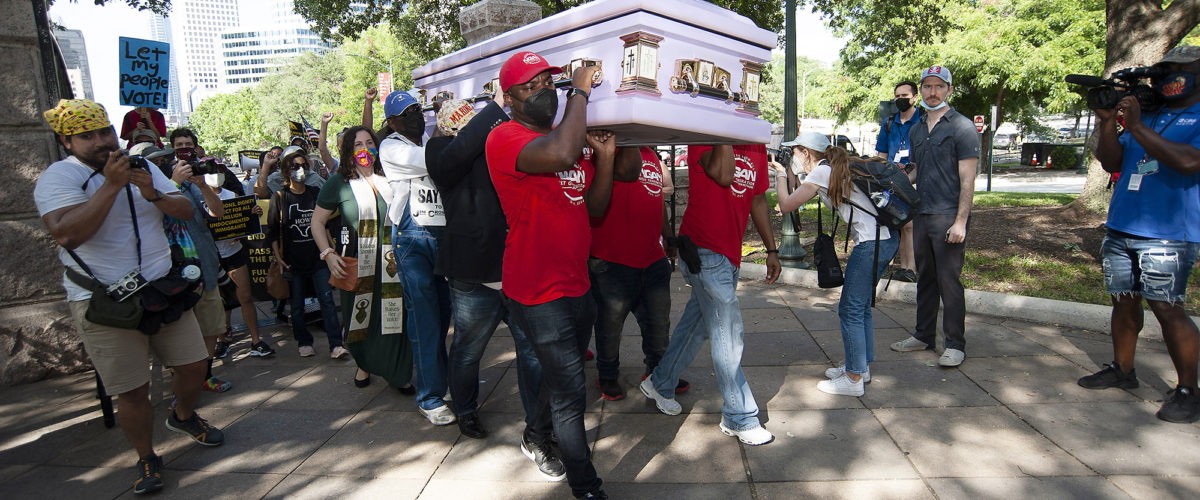A civil rights demonstration at the Texas State Capitol July 31— that included country music legend Willie Nelson and former Texas Rep. Beto O’Rourke — was intended to warn Americans about the dangers of nationwide voter suppression efforts and to signal conservatives that attempts to undermine democracy will not go unchallenged, organizers said.
The leader of the effort told thousands of sign- and banner-wielding protesters gathered in Austin that the message seemed to be hitting home.
“When you look out here and see the diversity of this crowd — this is the America they are afraid of,” said Bishop William T. Barber II, co-chair of the Poor People’s Campaign. “This is what the corporate elites are afraid of. It’s not new. It’s only been regurgitated and vomited up and repackaged. They are afraid of demographic shifts, and they know they cannot hold onto power.”
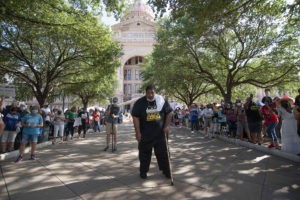
William J. Barber II stands with the Poor People’s Campaign at the Texas State Capitol to demand federal action on voting rights. (Mario Cantu/CSM via ZUMA Wire via AP Images)
The rally, which was livestreamed on Facebook, capped a four-day procession that began in Georgetown, Texas, and was organized by the campaign. It was billed as a “Selma-to-Montgomery” style march because the 1965 non-violent event helped spark federal voting rights legislation to overcome racist voting laws in many states, especially in the South.
The campaign’s Texas leadership called the national organizers for help when Republicans in the state Legislature introduced a measure limiting voter access in multiple ways. The bill passed the state Senate in June, but House Democrats fled the state to prevent the quorum needed to pass it there. At least 28 similar laws have been adopted across the nation already under the banner of “election integrity.”
The campaign and its allies already had launched “a season of nonviolent moral direct action” to demand full restoration of the 1965 Voting Rights Act, passage of the For the People Act, an increase in the federal minimum wage to $15 an hour, fair treatment for immigrants and an end to the U.S. Senate filibuster used to block these and other legislation.
Texas was selected as the site for the march to “nationalize” the movement, Barber said during the rally. “This is why we march now. This is why we take moral action now. Because the infrastructure of this democracy is being threatened now.”
Texas has become a focal point of the Republican effort to continue the restrictive policies of the Trump administration, along with perpetuation of the lie that Trump was denied reelection because of massive voter fraud. Conservative Republican Gov. Greg Abbott has a challenger from the far right of the party in next year’s Republican primary.
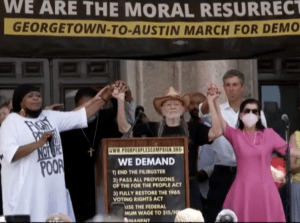
Willie Nelson (center) with Luci Baines Johnson (right)
A variety of other voices participated in the rally, including the physically disabled, working poor, Black Americans, immigrants and others most impacted by Republican efforts to stifle wages, oppose affordable health care, and limit voting access by eliminating ballot drop boxes, mail-in ballots and local control of elections.
Nelson got into the act by singing “if you don’t like who’s in there, vote them out.”
Several clergy spoke during the protest, including Frederick D. Haynes III, who connected conservative attempts to limit the voting rights of the disenfranchised with their attacks on Critical Race Theory, which holds that systemic racism underlies U.S., state and federal policies impacting people of color.
“You are fighting against Critical Race Theory while at the same time you have a special session called that illustrates what Critical Race Theory is all about,” said Haynes, senior pastor at Friendship-West Baptist Church in Dallas.
Haynes added that Texans go to great lengths to undermine democracy “while at the same time Texas is at the bottom of educating our children, … while at the same time we are the state that is least insured.”
But the march and rally demonstrated that the willpower exists to oppose those moves, he said.
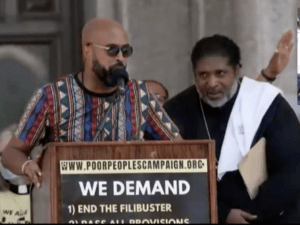
Frederick Hayne speaking with William Barber listening.
“It is a new day in Texas because even as ‘Janet and James Crow, Esq’ are trying to run Texas, there is a spirit of Selma that has come to Texas” with the Poor People’s Campaign and Barber, he said. “They brought the spirit of Selma here because Selma reminds us that change doesn’t come from Washington, D.C., down, it comes from Austin up.”
O’Rourke, a former Democratic presidential contender, described Texas as a logical starting place for the movement given it is “the hardest state in which to vote” and where “700 polling places” have been closed “mostly in low-income and Black and brown neighborhoods.”
“For those who are tempted to despair at this moment given everything that we’re up against — those Republicans who would rather defend insurrection than support our democracy, these rigged voting laws in Georgia in Florida and a dozen other states that are going to make it harder for so many millions of our fellow Americans to vote — I ask you to think … about every man and every woman who had the courage of their convictions and did what they had to do at their own moment of truth in this country’s history.”
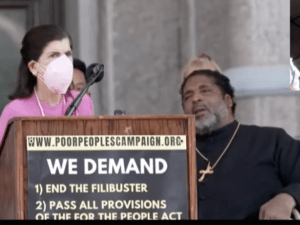
Luci Baines Johnson, with William Barber listening.
Luci Baines Johnson evoked the memory of her father signing the 1964 Civil Rights Act and 1965 Voting Rights Act into law and how he gained courage from the grassroots in Texas and elsewhere to do so.
It “couldn’t have been done without you, the people,” she said. “It was the right thing then, and it’s the right thing now.”
Organizers included a casket at the speakers’ platform to underscore their view that the Voting Rights Act has been all but buried.
“This casket represents that statehouses all over the country are trying to have a funeral for our voting rights and a living wage,” Barber said. “They are trying to bury them. But we are the moral resurrection, and it will not happen on our watch.”
Former President Donald Trump was identified as the symbol and charisma behind the anti-democracy movement.
“They had a cult leader who became president. He didn’t create the lie, he charismatized it and with corporate help he financed it. All for the love of power and the love of money,” Barber said.
President Joe Biden and Democrats in Congress also were jabbed for not doing enough to reverse course. “No need to have power if you are not going to use it for good,” Barber said.
Related articles:
Poor People’s Campaign plans a march in Texas to protest restrictive voting legislation
Three reasons 2021 looks like 1961 in voter suppression | Opinion by Bill Leonard
Critical Race Theory, voter suppression and historical negation: The irony of it all | Opinion by Bill Leonard
A vote is ‘a kind of prayer,’ Warnock says in first Senate speech

